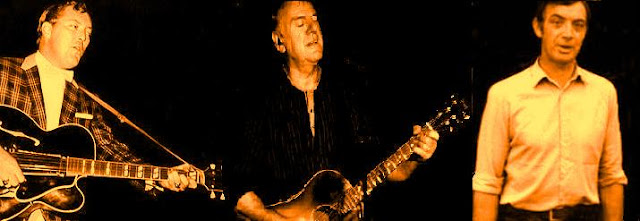28 February 2010
Stand by him
As a footnote to the posts about Stand By Me, two youtube clips with a bearing on my comments about seeing Ben E King with the Drifters in the eighties.
27 February 2010
Yes, I remember Doc and old "Beat Me Daddy" Slack. It was late June. Or The Imperfect Enjoyment
As promised, both sides of the rock'n'roll-anticipating 78 found in my grandfather's attic in the early seventies and presumably once prized by him. I don't know whether John R.T. Davies ever got his hands on a copy of this record , but having heard several CD transfers and listened to the BBC's copy on a record request programme I can say that the sound you will hear below is better than average. A CD I had of Bradley/McKinley sides had certain frequencies boosted, resulting in trebly, prominent vocals but no bottom. You've got to have a bottom.
Waxing/waning crescent moon (Sam Cooke in the Soul Stirrers)
Daniel Wolff's liner notes for the Sam Cooke Complete Specialty Recordings set, mentioned earlier in connection with his biography of Cooke (above), include details which are particularly relevant to the discussion of Stand By Me and the overlapping of musical forms in the fifties. An extensive interview with Lloyd Price can be found on Matt the Cat's site here, but for all the undoubted importance of Lawdy Miss Clawdy to the development of rock'n'roll (none of which seems lost on Price himself) Wolff suggests that the recording was part of an ongoing process for Specialty owner Art Rupe:
25 February 2010
The elusive man and his accessible music: Sam Cooke
I'll return to the subject of Stand By Me (last two posts) with an additional entry of related links or by revising those posts at a later date. Probably both, actually. But as Sam Cooke featured so prominently in them, now seems a good moment to include three pieces about Cooke written earlier.
21 February 2010
Stand By Me - Part One
I can't remember when I first heard Stand By Me. It may even have been the Lennon reworking, as my earliest definite memory is of dancing to his version during one of the regular rock'n'roll nights at Tiffany's, Glasgow, in 1975, the enduring Rollin' Joe reassuring us (or himself): "John Lennon's coming home."
Labels:
alan freed,
beatles,
ben e king,
bill millar,
cholly atkins,
chuck berry,
clyde mcphatter,
dave marsh,
drifters,
gerri hirshey,
inkspots,
leiber and stoller,
marv goldberg,
moonglows,
phil spector
20 February 2010
Stand By Me - Part Two
By the mid to late 50s, artists like Ray Charles and Sam Cooke were beginning to realise there was a lot to learn from the stripped down language of gospel songs as well as the singing which McPhatter had already introduced to a wider audience. They developed a new kind of music, with words cut to the bone, giving the singer space to linger over them, put more of himself into the performance: what was to become known as soul music.
Some say that There Goes My Baby is the first soul record; others go back to Ray Charles' I Got a Woman (1954), based on a gospel song; Charlie Gillett (author of the first serious study of Rock'n'Roll, The Sound of the City) has pointed out that the horns on this record are effectively doing the job of backing singers in a gospel quartet.
12 February 2010
Canal ... plus
Before drifting away to other matters I'd like to talk about another of Ralph McTell's songs, Barges, which must have featured on that lost cassette of the Apollo concert (see previous post) as I hear it in my head as voice and guitar, unadorned.
6 February 2010
Ralph, William and Jake (and Davey) or Act As Known
Since completing the previous post about Jake Thackray I have made three attempts at new subjects, but the Thackray-related topic which keeps pushing itself forward is that of Ralph McTell, forced to bear witness, chorus-like, to his friend's retreat from performing.
Subscribe to:
Comments (Atom)








